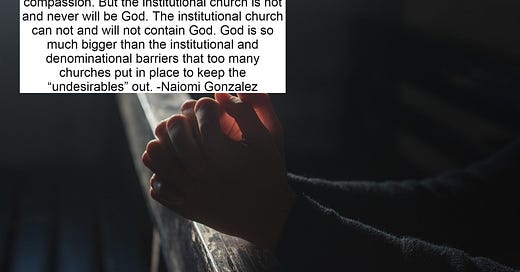Mental Illness, Faith, and The Church
The Lord is near to the brokenhearted,
and saves the crushed in spirit.-Psalm 34:18 NRSV
Too many Christians treat faith as an anti-depressant. Meaning, they believe that if someone just has enough faith then their mental health struggles will go away. Depression and anxiety are treated as lapses of faith. More severe mental illnesses are associated with at worst, demons, or at best, they are the end result of generational sin passed down from family member to family member.
The consequences of untreated mental illness: can leave lives wrecked. And instead of compassion and care, some Christians treat it as an excuse to say, "well they should have obeyed God and trusted Jesus." In many Christian circles, mental illness is pathologized and depicted as a failure of faith.
And let me be clear, even the more enlightened "Progressive Christians" who eschew the language of demon possession or generational sin, can adhere to toxic theology when it comes to mental illness as well. In fact, during my early 20s, it was a progressive Christian congregation, who proudly preached social justice in every sermon, that washed their hands of me when I was experiencing a severe mental health crisis. (Without going into details, I do want to clarify, I was not a danger to anyone else).
On the one hand, I acknowledge how painful and scary that must have felt for the pastor and other leaders to have a member experience a crisis. On the other hand, they demonstrated a profound lack of compassion and understanding. They preached social justice on a national and global level, but when it came to practicing it within their own congregation, they failed.
Unlike some of their conservative peers, this progressive congregation encouraged medication and therapy. They claimed to want to de-stigmatize mental illness. However, when it came to dealing with the messiness of mental illness and the myriad ways it manifests itself, they were ill equipped. They preached the importance of de-stigmatizing mental illness, but when mental illness manifested itself in ways that offended their predominantly, white, middle class sensibilities, they treated sufferers like trash to be thrown away.
And my story is not unique. Institutional Christianity-across the theological and political spectrum, has by and large, (with notable exceptions) failed to care and love for some of the most vulnerable within their congregations-those struggling with mental illness. On the more conservative end, they have denied the science behind mental illness, turning it into an individual failing and in some cases, denying the benefits of medication.
On the more progressive end, they accept and welcome those who are mentally ill…as long as their symptoms remain within the realm of respectability. You can be depressed, but make sure you still wear the right clothing. You can have a personality disorder, but it better not be a major inconvenience. You can have anxiety, but make sure it doesn’t impede your ability to do what we need from you.
It’s one thing to be cognizant of the need to protect the rest of the congregation, but let’s be honest, in too many cases, the mentally ill are driven out of progressive spaces not because they pose a threat to others, but because they inconvenience others. They hurt the sensibilities and respectability of others within the congregation.
But luckily, the institutional church, with all its failings and oppressive structures, is not God. At best, the institutional church may occasionally provide glimpses of God’s love and compassion. But the institutional church is not and never will be God. The institutional church can not and will not contain God. God is so much bigger than the institutional and denominational barriers that too many churches put in place to keep the “undesirables” out.
Can a mother forget the infant at her breast,
walk away from the baby she bore?
But even if mothers forget,
I’d never forget you—never. -Isaiah 49:15 The Message
To God, those of us who struggle with mental health aren’t a burden. We aren’t monsters. We aren’t awful sinners who deserve our fate because we disobeyed God, or we lack faith. To God we are their beloved children. And God journeys with us as we battle almost insurmountable societal barriers that make it difficult to survive and to live.
God knows and deeply feels our pain. And in the darkest of moments, when we have been discarded by those we care about, when the institutional church has turned its back on us, God holds us in their warm embrace, like a loving parent comforting a crying child. God ensures us we are worthy to be loved, and we are enough.
And for the institutions that harm us? The systems that discard us? I believe they will face God’s judgement. Now let me be clear, I reject how modern Christianity has individualized God’s judgement and wrath and has weaponized it to uphold oppression and violence. I also reject the idea that God condemns individuals to an eternity of pain and suffering or eternal annihilation. But I do believe that God will destroy systems and institutions of oppression. I do believe that institutions and barriers that exist to oppress and cause violence, will one day, be no more.
Note: Apparently I used the British variation of "judgement." I am keeping it, because that spelling makes much more sense than the American English version.



